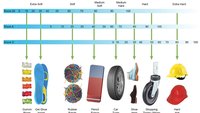Are we taking bets on which federal department is going to be sacked next?
Dirtiest Oil on Earth
Are we taking bets on which federal department is going to be sacked next?
Haha. Likely the one that did the above study! (See KenN's post).
Those people likely just researched their way out of a job
Why slag free swag?:rolleyes:
ummm, as your doctor i recommend against riding with a scaphoid fracture.
There's nothing better than an Orangina after cheating death with Digger.
i think the protesting against pipelines is misplaced. the fight instead should be against the need for pipelines - seems to me that the lines are a neccsary evil of our current love affair with oil. instead of protesting against keystone - an "easy" target, no doubt, and one that enables the expansion of oilsands production, the protest should be against consumption of oil in the first place.
pipelines are the safest way to move oil over land - we should embrace the construction of new lines, and better yet the replacement of old ones. with that said, the focus of government shouldnt be on decideing to allow permission of keystone or not, but rather on ways to make the construction of new pipelines useless in the first place. help us move away from oil not thru artificial bottlenecking but thru good policy.
i forget the name of the tax in bc, it's supposed to be revenue neutral, but the idea is that you pay more tax at the pump, then get a set re-embusrment of average tax paid per capita or whatever. ide suggest that implementing a tax/redistribution like this everywhere is a good way to drive up the cost of fuel while not actually taxing the population. a portion of the tax could even be collected as a fund to provide reasearch into other energy sources/whatever. gas in the states is cheap.
interested in hearing feedback on my train of thought here.
^^^
I agree … if you (among other things) get in your car and drive it every day, your outrage is misplaced.
^^^
I agree … if you (among other things) get in your car and drive it every day, your outrage is misplaced.
Are you saying that if you drive a car you have no right to take issue with allegations such as:
When she refused to leave, the doctor called an unnamed government representative to seek permission for the testa process Karla thought was unusual. Permission was granted, but as the Vancouver Observer reported, the hospital ran a type of blood test that is useless for detecting petro-chemical compounds
Shell trained him to watch for hydrocarbon odours on the job and to get out of the area if odours became too strong. Twenty years ago we couldnt work in these kinds of conditions, but now I have to sleep in them? he asked.
This poor reputation owes mostly to the way that the AER investigates odour incidents. A resident smells something and calls the AER to complain, and the AER then calls the company and asks them if there have been any toxic releases.
^^^
I agree … if you (among other things) get in your car and drive it every day, your outrage is misplaced.
Aficionados of critical thinking methods will recognize this as a false dichotomy.
When one person suffers from a delusion, it is called insanity.
When many people suffer from a delusion, it is called religion.
i think the protesting against pipelines is misplaced. the fight instead should be against the need for pipelines - seems to me that the lines are a neccsary evil of our current love affair with oil. instead of protesting against keystone - an "easy" target, no doubt, and one that enables the expansion of oilsands production, the protest should be against consumption of oil in the first place.
pipelines are the safest way to move oil over land - we should embrace the construction of new lines, and better yet the replacement of old ones. with that said, the focus of government shouldnt be on decideing to allow permission of keystone or not, but rather on ways to make the construction of new pipelines useless in the first place. help us move away from oil not thru artificial bottlenecking but thru good policy.
i forget the name of the tax in bc, it's supposed to be revenue neutral, but the idea is that you pay more tax at the pump, then get a set re-embusrment of average tax paid per capita or whatever. ide suggest that implementing a tax/redistribution like this everywhere is a good way to drive up the cost of fuel while not actually taxing the population. a portion of the tax could even be collected as a fund to provide reasearch into other energy sources/whatever. gas in the states is cheap.
interested in hearing feedback on my train of thought here.
the general public will not let go of their oil for automobiles, plastics, fertilizers etc as it makes our lives just so damn comfy. if we really wanted to solve our oil dependency problem we would tax the shit out of it. try like an additonal $1/L at the pump and put that money directly into mass transit options.
that would result in an additional 10 billion extra per year for transit based on fuel sales in BC in 2012. now granted, that number would drop as fewer people will use their automobiles. so lets say there's even a 50% drop, that still 5 billion PER YEAR for transit. somthing similar could be done for plastics produced here and then tarrifs added for plastics brought in from off shore.
imo this is the only type of thinking that's going to make a significant dent in the environmental costs of our use of oil.
i think the avg person simply doesn't realize how much our lives entirely depend on oil - basically everything we touch has been influenced by oil in some way. when oil disappears our courrent lifestyle is toast.
We don't know what our limits are, so to start something with the idea of being limited actually ends up limiting us.
Ellen Langer
Aficionados of critical thinking methods will recognize this as a false dichotomy.
Im glad someone pointed that out.
Just because you use a car, use plastics, etc. doesn't mean you're on board with oil. There are institutional/systemic impediments which limit what goods we can consume.
Additionally, you can be anti-pipeline(s) and still be 'pro-oil'. (or at least not anti-oil).
One can also be 'pro-oil' and still be anti-tar-sands-oil.
the general public will not let go of their oil for automobiles, plastics, fertilizers etc as it makes our lives just so damn comfy. if we really wanted to solve our oil dependency problem we would tax the shit out of it. try like an additonal $1/L at the pump and put that money directly into mass transit options.
that would result in an additional 10 billion extra per year for transit based on fuel sales in BC in 2012. now granted, that number would drop as fewer people will use their automobiles. so lets say there's even a 50% drop, that still 5 billion PER YEAR for transit. somthing similar could be done for plastics produced here and then tarrifs added for plastics brought in from off shore.
imo this is the only type of thinking that's going to make a significant dent in the environmental costs of our use of oil.
i think the avg person simply doesn't realize how much our lives entirely depend on oil - basically everything we touch has been influenced by oil in some way. when oil disappears our courrent lifestyle is toast.
I agree with the bulk of this but disagree with parts of it. You're right to say that our lives (and lifestyle) are way more affected by oil than we probably realize. That said, I dont think they have to be. I think we are largely oil-needing, not because we need to be, but because thats whats been imposed on us, at least in recent years. I.e. I think that there are some very smart people developing some very smart technologies that would could minimize oil dependence… but these smart people don't know the right people, yet.
In regards to tax, when I put on my economist hat, I always get weary of taxing the sh*t out of something. In practice, it tends to have weird (heterogenous) effects across the population. For example, the doctor/lawyer/CEO may notice no difference to taxes on oil, while the forestry worker/carpenter/etc would notice them significantly.
Im glad someone pointed that out.
Just because you use a car, use plastics, etc. doesn't mean you're on board with oil. There are institutional/systemic impediments which limit what goods we can consume.
Additionally, you can be anti-pipeline(s) and still be 'pro-oil'. (or at least not anti-oil).
One can also be 'pro-oil' and still be anti-tar-sands-oil.
i don't necessarily Duncan's comment has to be seen as a false dichotomy, there will be situations where his point holds water. how about people using fuel hogging vehicles when they have better options - ie the person driving a v8 full sized suv for nothing more than commuting to the office? they should be examining their own habits and contributions first such as using a smaller or more fuel efficient car for that sort of driving.
We don't know what our limits are, so to start something with the idea of being limited actually ends up limiting us.
Ellen Langer
I agree with the bulk of this but disagree with parts of it. You're right to say that our lives (and lifestyle) are way more affected by oil than we probably realize. That said, I dont think they have to be. I think we are largely oil-needing, not because we need to be, but because thats whats been imposed on us, at least in recent years. I.e. I think that there are some very smart people developing some very smart technologies that would could minimize oil dependence… but these smart people don't know the right people, yet.
yeah, we're on the same line of thinking here for the most part. however i do feel that there are better choices available now but many people won't take them because they are harder choices. as technologies that reduce our oil dependency become more readily available people will probably adopt as long as they don't decrease their standard of living.
In regards to tax, when I put on my economist hat, I always get weary of taxing the sh*t out of something. In practice, it tends to have weird (heterogenous) effects across the population. For example, the doctor/lawyer/CEO may notice no difference to taxes on oil, while the forestry worker/carpenter/etc would notice them significantly.
you're right that it's something that would need checks and balances, but transportation fuels and heating oils make up about 75% of all oil use so that's where taxing it would make the biggest impact. if you need fuel to run your business there could be tax credits to lessen the negative effects.
like has been said many times by vaious people in various threads, at the end of the day the public will to effect change simply is not there. reducing consumption just isn't important enough to enough people and i personally don't think we'll hit that critcal mass until the environment has gone past the tipping point. the only question left to ask is how close are we to that point.
We don't know what our limits are, so to start something with the idea of being limited actually ends up limiting us.
Ellen Langer
Are you saying that if you drive a car you have no right to take issue with allegations such as:
You can "take issue" with this, that and the other or whatever you want. But if the best you can do is cut-and-paste on interwebz forums and avoid filling up at Shell stations whenever its not too inconvenient, no amount of critical thinking will accomplish any change.
You can "take issue" with this, that and the other or whatever you want. But if the best you can do is cut-and-paste on interwebz forums and avoid filling up at Shell stations whenever its not too inconvenient, no amount of critical thinking will accomplish any change.
Would this be considered a strawman or a false dichotomy fallacy? Or a combination of the two? Perhaps with a just a dab of red herring in there for flavour?
Forum jump:







